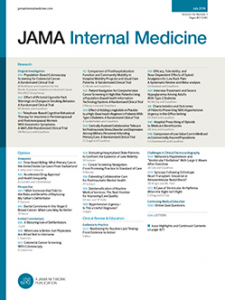
One of the many fun things about reporting on retractions is that we get to expand our statistical knowledge. To wit, follow along as we explore the concept of immortal time bias.
A JAMA journal has retracted and replaced a paper by authors at the University of Massachusetts after another researcher identified a critical statistical error in their study.
The paper, “Association of Antibiotic Treatment With Outcomes in Patients Hospitalized for an Asthma Exacerbation Treated With Systemic Corticosteroids,” was written by a group led by Mihaela Stefan, the associate director of the Institute for Healthcare Delivery and Population Science at UMass, and appeared in JAMA Internal Medicine in 2019.
The study purported to find that:*
Continue reading ‘Immortal time bias’ fells JAMA journal asthma paper
 Last week,
Last week, 
 JAMA and another journal in its network have retracted three 2005 papers about preventing hip fractures, after an admission of scientific misconduct.
JAMA and another journal in its network have retracted three 2005 papers about preventing hip fractures, after an admission of scientific misconduct. 